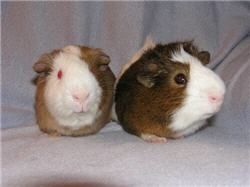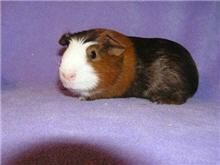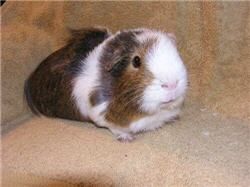Things Your Guinea Pigs Want You To Know

What Do Experienced Owners Know About Their Pig Pals?
If you're contemplating bringing guinea pigs into your home, you're probably wondering what advice experienced owners have for prospective and new owners, beyond the hard facts you're already learning through your research.
If you asked 100 owners for insights into the guinea pig temperament, you'd likely get hundreds of different answers. Guinea pigs may be small but they have very big personalities!

They're Smarter Than You Think
"Small Animal" Doesn't Mean "Small Intelligence
Anyone who says guinea pigs are dumb little creatures has never spent much time with one. These little pips know which time of day you're at your most relaxed, and they'll milk it for all it's worth for extra snuggles or extra snacks (or both).
Owners swear their guinea pigs can tell the difference in sounds made by different plastic bags in the next room, squeaking appropriately when it's a produce bag and staying silent when it's not. Others have reported on guinea pigs burying not-so-favorite vegetables into cage bedding and piles of hay - effectively tricking their humans into thinking the pigs ate everything and are still hungry.
Guinea pigs, like any living creature with a brain (and, therefore, intelligence), need stimulation, interaction, and socialization. Without all three, they become bored, lethargic, reclusive, and depressed. This is why guinea pigs need to be adopted in pairs; having a roommate of their own species provides a tremendous amount of the stimulation, interaction, and socialization that they need. Daily snuggle time with their humans provides more. So, too, does a changing array of toys and whatnot in their cages and play areas.

They're Creatures Of Habit
Consistency Is A Virtue
You will unwittingly get roped into more routines than you'd ever thought possible with a 2-1/2 pound critter. For humans who aren't always good at disciplined routines, guinea pigs' habits can actually be a good thing, serving as the bedrock around which other routines can be developed.
Guinea pigs rarely change habits easily or quietly. If you got into the routine of giving them lettuce and sweet bell pepper chunks at 7:30 in the morning before you leave for work, you'll see them pace in their cage actively trying to get your attention if you're late. If you get behind schedule, they're not above squeaking and wheeking until you serve breakfast. If they're used to getting a chunk of carrot every evening, don't be surprised if a symphony of squeaks starts up at 11:30 because they haven't gotten their snack yet. It would be annoying if they weren't so cute.
Owners have written in online forums about being locked in month-long battles of will with their guinea pigs when they've tried to wean them off of daily servings of commercial treats (the junk food of the guinea pig diet), with the pigs picking over everything else given to them in an overt attempt to manipulate their humans into forking over the treats.

They're More Emotional Than You Think
There Should Be A Psych Course For Owners
No, they're not basketcases or perpetually nervous nellies, but guinea pigs do have more emotional needs - and stronger personalities - than most people realize. They have their own unique psychology, which takes some time, and careful attention to guinea pig behavior, to learn. They can be territorial (though it's rare), choosy about who they'll room with, and picky about toys and cage accessories. A guinea pig can become out of sorts if their favorite pigloo is taken out of the cage and replaced with something else, or if you replace their favorite hay with a different brand. A guinea pig that will cozy up with a roommate in their waffle block house may refuse to share a cozy cup with them.
On a more profound scale, guinea pigs become very easily depressed if
- they live alone
- their humans go too many days in a row (even as little as three days) without substantive interaction with them (e.g., no laptime)
- a roommate dies
- a family abandons them (older guinea pigs are especially hard hit emotionally when their family abandons or surrenders them)
- their cages are poorly maintained
- their diets lack proper nutrition or variety
Once a guinea pig becomes depressed, assorted other health problems can ensue if owners don't act quickly to turn things around. Depression can be avoided if they have roommates of their own species, frequent interaction with their humans, and a consistent routine.

They Need More Living Space Than You Think
Although guinea pigs are small, they still need ample living space. When you consider that most guinea pigs will spend 22 hours a day in their cage (assuming that they get out daily for a two-hour play period), it's easy to see why they need so much space. Their cage needs to accommodate more than just eating and sleeping. They need to have a cage large enough to let them have a bathroom corner away from where they eat and sleep. They need to have room to play, and to get a good run going when the mood strikes them each day. And they need space to get away from each other occasionally, which helps keep the peace over the long haul (the same way humans need to have some space from each other).
Sadly, we encounter too many pigs who have been kept in aquarium tanks, plastic storage tubs, and pet store cages that provide a third of the space that guinea pigs actually need. All three of these "cage types" are little more than poorly ventilated litter boxes that open the door to a host of potential health problems caused by living in bacteria-rich environments. When The Critter Connection has taken in pigs who lived in aquarium tanks or plastic storage tubs, we've had to work at length to help guinea pigs get used to their new exposure to light and sound, which were greatly filtered and buffered in the tanks and tubs. One male guinea pig who came into the rescue after living in a poorly kept aquarium tank for a couple of years, had actually banged his head against the glass repeatedly - presumably trying to get out.
You'd be hard-pressed to find any true-blue guinea pig advocate (owner or rescue worker) who disagrees with the living space recommendations listed on the Guinea Pig CagesWeb site:
- 1 pig: 7.5 square feet or more
- 2 pigs: 10.5 square feet or more
- 3 pigs: 13 square feet or more
- 4 pigs: 16 square feet or more
No matter how happy guinea pigs seem to be in their current digs, the change in their spirits, their sociability, and their energy level is unmistakable once they've been moved into the larger, open-topped C&C cages. And happier pigs mean healthier pigs.

Their Diet Can Help You Improve Your Diet
You Might Finally Kick That Junk Food Habit
Guinea pigs benefit greatly from having a wide variety of fresh fruits and vegetables in their daily diet. While things like romaine lettuce, green leaf lettuce, carrots, and sweet bell peppers are a favorite of guinea pigs, there's so much more that they can be fed - like Swiss Chard, curly endive (a.k.a., chicory), escarole, parsley, cilantro, Crenshaw melon, honeydew melon, and more (see the Guinea Lynx chart).
As guinea pigs get older, it's not uncommon for them to lose their previous affinity for a particular veggie or fruit, either temporarily or permanently. It's understandable - we humans would get bored if the only vegetables we ate day after day were romaine lettuce and carrots. Maintaining variety in their diet helps reduce the risk of boredom with a particular food item.
Experimenting with new menu options for your pigs also provides a great opportunity for you to add more vegetables and fruits to your diets, by way of snazzing up your salads, revving up your snacks, and introducing new sides to your meals. If you have kids, you can use "menu planning" as a fun and valuable lesson in nutrition and good eating habits. And you and your kids will be well-rewarded by the sounds of your guinea pigs happily crunching on their new snacks.



